2015 年 12 月英语四级真题及答案第三套
Part Ⅰ Writing ( 30 minutes)
Directions: For this part, you are allowed 30 minutes to write an essay commenting
on the saying"Never go out there to see what happens, go out there to make things
happen." You can citexamples to illustrate the importance of being participants
rather than mere onlookers inlife.You should write at least 120 words but no more
than 180 words.
Part Ⅱ Listening Comprehension ( 30 minutes)
Section A
Directions : In this section, you will hear 8 short conversations and 2 long
conversations.At the end ofeach conversation, one or more questions will be asked
about what was said.Both theconversation and the questions will be spoken only
once.After each question there will bea pause.During the pause, you must read the
four choices marked A, B, Cand D,and decide which is the best answer. Then mark the
corresponding letter on Answer
Sheet 1 with a single line through the centre.
1.A.Children should be taught to be more careful.
B.Children shouldn't drink so much orange juice.
C.There is no need for the man to make such a fuss.
D.Timmy should learn to do things in the right way.
2.A.Fitness training.
B.The new job offer.
C.Computer programming.
D.Directorship of the club.
3.A.He needs to buy a new sweater.
B.He has got to save on fuel bills.
C.The fuel price has skyrocketed.
D.The heating system doesn't work.
�
4.A.Committing theft.
B.Taking pictures.
C.Window shopping.
D.Posing for the camera.
5.A.She is taking some medicine.
B.She has not seen a doctor yet.
C.She does not trust the man's advice.
D.She has almost recovered from the cough.
6.A.Pamela's report is not finished as scheduled.
B.Pamela has a habit of doing things in a hurry.
C.Pamela is not good at writing research papers.
D.Pamela's mistakes could have been avoided.
7.A.In the left-luggage office.
B.At the hotel reception.
C.In a hotel room.
D.At an airport.
8.A.She was an excellent student at college.
B.She works in the entertainment business.
C.She is fond of telling stories in her speech.
D.She is good at conveying her message.
Questions 9 to 11 are based on the conversation you have just heard.
9.A.Arranging the woman's appointment with Mr.Romero.
B.Fixing the time for the designer's latest fashion show.
C.Talking about an important gathering on Tuesday.
D.Preparing for the filming on Monday morning.
10.A.Her travel to Japan.
B.The awards ceremony.
C.The proper hairstyle for her new role.
D.When to start the make-up session.
11.A.He is Mr.Romero's agent.
�
B.He is an entertainment journalist.
C.He is the woman's assistant.
D.He is a famous movie star.
Questions 12 to 15 are based on the conversation you have just heard.
12.A.Make an appointment for an interview.
B.Send in an application letter.
C.Fill in an application form.
D.Make a brief self-introduction on the phone.
13.A.Someone having a college degree in advertising.
B.Someone experienced in business management.
C.Someone ready to take on more responsibilities.
D.Someone willing to work beyond regular hours.
14.A.Travel opportunities.
B.Handsome pay.
C.Prospects for promotion.
D.Flexible working hours.
15.A.It depends on the working hours.
B.It is about 500 pounds a week.
C.It will be set by the Human Resources.
D.It is to be negotiated.
Section B
Directions..In this section, you will hear 3 short passages.At the end of each
passage, you will hearsome questions.Both the passage and the questions will be
spoken only once.After youhear a question, you must choose the best answer from the
four choices marked A., B,Cand D..Then mark the corresponding letter on Answer Sheet
1 with a single linethrough the center.
Passage One
Questions 16 to 19 are based on the passage you have just heard.
16.A.To give customers a wider range of choices.
B.To make shoppers see as many items as possible.
�
C.To supply as many varieties of goods as it can.
D.To save space for more profitable products.
17.A.On the top shelves.
B.On the bottom shelves.
C.On easily accessible shelves.
D.On clearly marked shelves.
18.A.Many of them buy things on impulse.
B.A few of them are fathers with babies.
C.A majority of them are young couples.
D.Over 60% of them make shopping lists.
19.A.Sales assistants promoting high margin goods.
B.Sales assistants following customers around.
C.Customers competing for good bargains.
D.Customers losing all sense of time.
Passage Two
Questions 20 to 22 are based on the passage you have just heard.
20.A.Teaching mathematics at a school.
B.Doing research in an institute.
C.Studying for a college degree.
D.Working in a hi-tech company
21.A.He studied the designs of various clocks.
B.He did experiments on different materials.
C.He bought an alarm clock with a pig face.
D.He asked different people for their opinions.
22.A.Its automatic mechanism.
B.Its manufacturing process.
C.Its way of waking people up.
D.Its funny-looking pig face.
Passage Three
Questions 23 to 25 are based on the passage you have just heard.
�
23.A.It is often caused by a change of circumstances.
B.It actually doesn't require any special treatment.
C.It usually appears all of a sudden.
D.It generally lasts for several years.
24.A.They cannot mix well with others.
B.They irrationally annoy their friends.
C.They depend heavily on family members.
D.They blame others for ignoring their needs.
25.A.They lack consistent support from peers.
B.They doubt their own popularity.
C.They were born psychologically weak.
D.They focus too much on themselves.
Section C
Directions: In this section, you will hear a passage three times.When the passage
is read for the firsttime, you should listen carefully for its general idea.When
the passage is read for thesecond time, you are required to fill in the blanks with
the exact words you have justheard.Finally, when the passage is read for the third
time, you should check what youhave written.
There was a time when any personal information that was gathered about us was typed
on a pieceof paper and26 in a file cabinet.It could remain there for years and,
often27, never reachthe outside world.
Things have done a complete about-face since then.28 the change has been the
astonishingly29 development in recent years of the computer.Today, any data that
is 30 about us in oneplace or another--and for one reason or another--can be stored
in a computer bank.It can then beeasily passed to other computer banks.They are owned
by individuals and by private businesses andcorporations, lending 31 , direct
mailing and telemarketing firms, credit bureaus, credit cardcompanies, and32 at the
local, state, and federal level.
A growing number of Americans are seeing the accumulation and distribution of
computerized dataas a frightening33 of their privacy.Surveys show that the number
�
of worried Americans has beensteadily growing over the years as the computer becomes
increasingly 34, easier to operate, andless costly to purchase and maintain.In 1970,
a national survey showed that 37 percent of the people35felt their privacy was being
invaded.Seven years later, 47 percent expressed the same worry.Arecent survey by
a credit bureau revealed that the number of alarmed citizens had shot up to 76percent.
Part Ⅲ Reading Comprehension(40 minutes)
Section A
Directions: In this section, there is a passage with ten blanks.You are required
to select one word foreach blank from a list of choices given, in a word bank following
the passage.Read thepassage through carefully before making your choices.
Each.choice in the bank isidentified by a letter.Please mark the corresponding
letter for each item on Answer Sheet2 with a single line through the center.You may
not use any of the words in the bankmore than once.
Questions 36 to 45 are based on the following passage.
Children do not think the way adults do.For most of the first year of life, if
something is out ofsight, it's out of mind.If you cover a baby's36toy with a piece
of cloth, the baby thinks the toyhas disappeared and stops looking for it.A
4-year-old may 37 that a sister has more fruit juicewhen it is only the shapes of
the glasses that differ, not the38 of juice.
Yet children are smart in their own way.Like good little scientists, children are
always testingtheir child-sized39 about how things work.When your child throws her
spoon on the floor for thesixth time as you try to feed her, and you say, "That's
enough! I will not pick up your spoon again!"
the child will 40 test your claim.Are you serious? Are you angry? What will happen
if she throwsthe spoon again? She is not doing this to drive you41; rather, she is
learning that her desires andyours can differ, and that sometimes those42 are
important and sometimes they are not.
How and why does children's thinking change? In the 1920s, Swiss psychologist Jean
Piagetproposed that children's cognitive (认知的) abilities unfold 43, like the
�
blooming of a flower,almost independent of what else is44in their lives.Although
many of his specific conclusions havebeen45 or modified over the years, his ideas
inspired thousands of studies by investigators all overthe world.
A.advocate
B.amount
C.confirmed
D.crazy
E. definite
F. differences
G. favorite
H. happening
I. Immediately
J. Naturally
K. Obtaining
L. Primarily
M. Protest
N. Rejected
O. theories
Section B
Directions: In this section, you are going to read a passage with, ten statements
attached
to
it.Eachstatement
contains
information
given
in
one
of
the
paragraphs.Identify the paragraphfrom which the information is derived.You may
choose a paragraph more than once.
Each paragraph is marked with a letter. Answer the questions by marking
thecorresponding letter on Answer Sheet 2.The Perfect Essay
A.Looking back on too many years of education, I can identify one truly impossible
teacher.Shecared about me, and my intellectual life, even when I didn't.Her
expectations were high--impossibly so.She was an English teacher.She was also my
mother.
B.When good students turn in an essay, they dream of their instructor returning it
�
to them in exactlythe same condition, save for a single word added in the margin
of the finalpage : "Flawless." Thisdream came true for me one afternoon in the ninth
grade.Of course, I had heard that genius couldshow itself at an early age, so I was
only slightly taken aback that I had achieved perfection at thetender age of
14.Obviously, I did what any professional writer would do; I hurried off to spread
thegood news.I didn't get very far.The first person I told was my mother.
C.My mother, who is just shy of five feet tall, is normally incredibly soft-spoken,
but on the rareoccasion when she got angry, she was terrifying.I am not sure if she
was more upset by my hubris(得意忘形) or by the fact that my English teacher had
let my ego get so out of hand.In any event,my mother and her red pen showed me how
deeply flawed a flawless essay could be.At the time,I am sure she thought she was
teaching me about mechanics, transitions (过渡), structure, styleand voice.But what
I learned, and what stuck with me through my time teaching writing atHarvard, was
a deeper lesson about the nature of creative criticism.
D.First off, it hurts.Genuine criticism, the type that leaves a lasting mark on you
as a writer, alsoleaves an existential imprint (印记) on you as a person.I have heard
people say that a writershould never take criticism personally.I say that we should
never listen to these people.
E. Criticism, at its best, is deeply personal, and gets to the heart of why we write
the way we do.Theintimate nature of genuine criticism implies something about who
is able to give it, namely,someone who knows you well enough to show you how your
mental life is getting in the way ofgood writing.Conveniently, they are also the
people who care enough to see you through thispainful realization.For me it took
the form of my first, and I hope only, encounter with writer'sblock--I was not able
to produce anything for three years.
F. Franz Kafka once said: "Writing is utter solitude (独处), the descent into the
cold abyss (深渊) ofoneself." My mother's criticism had shown me that Kafka is right
about the cold abyss, and whenyou make the introspective (内省的) descent that
writing requires you are not always pleased bywhat you find.But, in the years that
followed, her sustained tutoring suggested that Kafka might bewrong about the
�
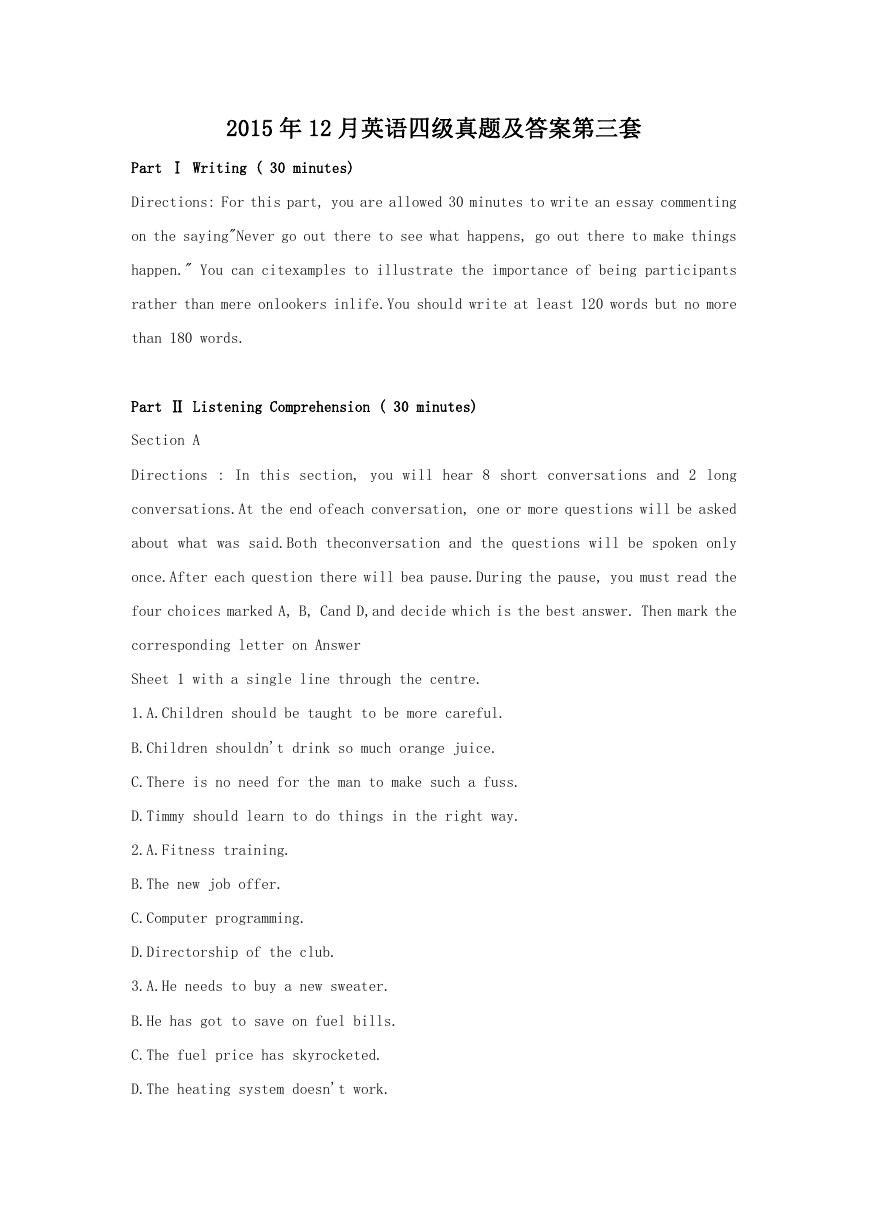
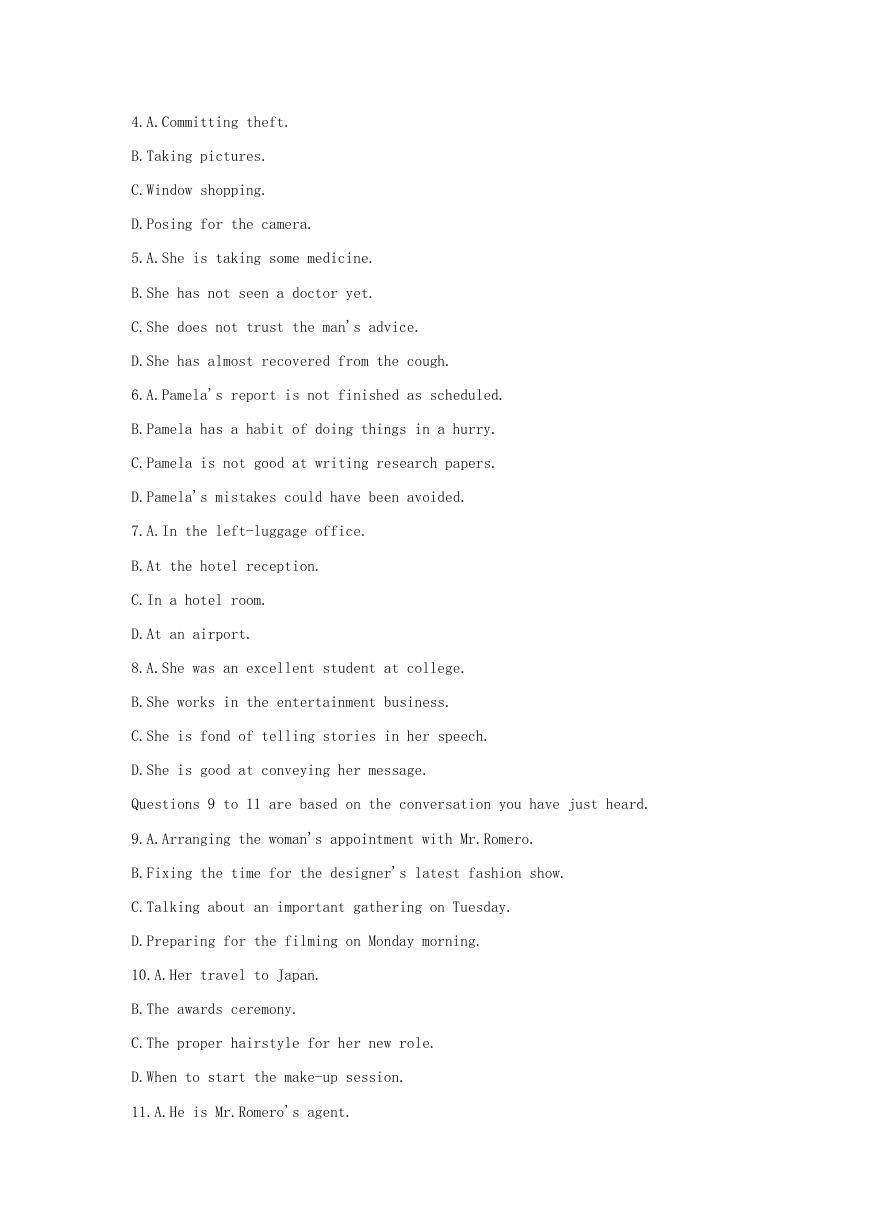
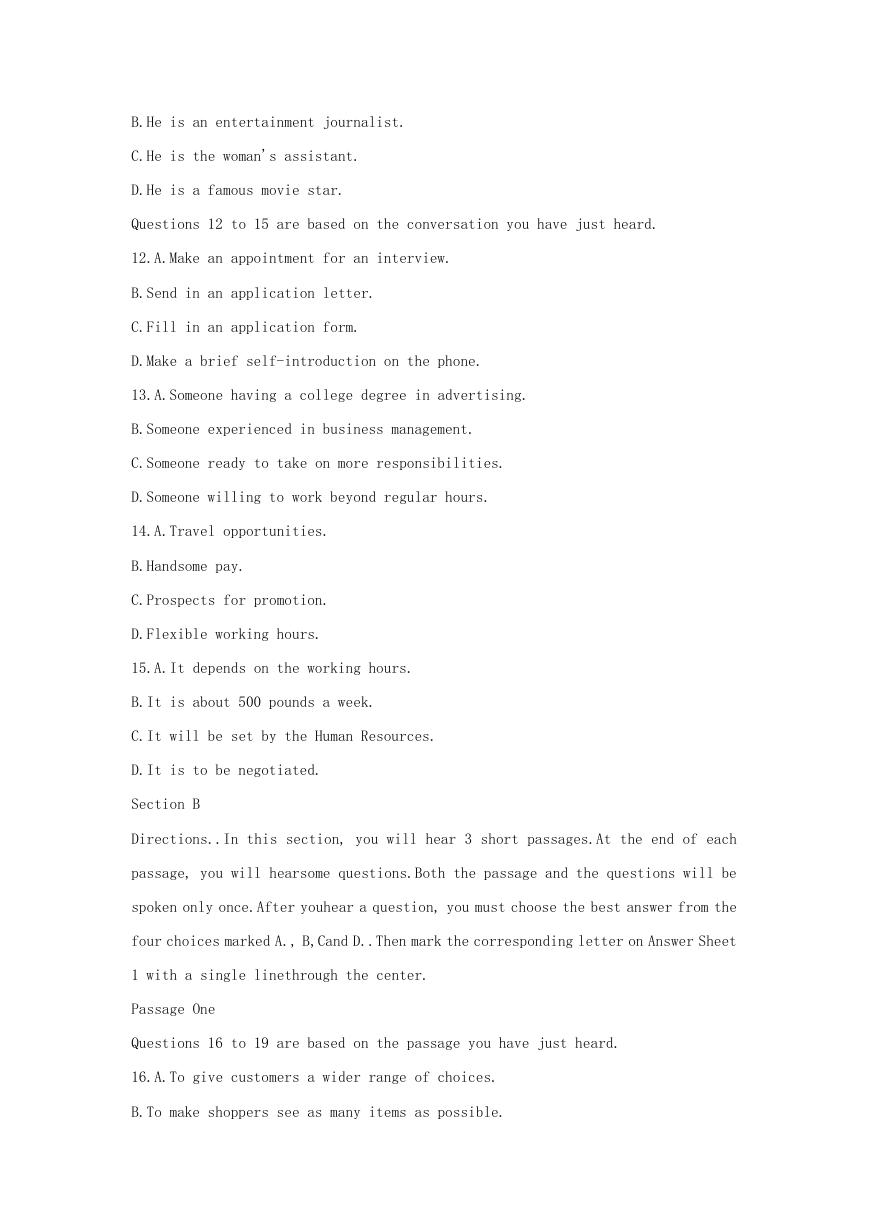
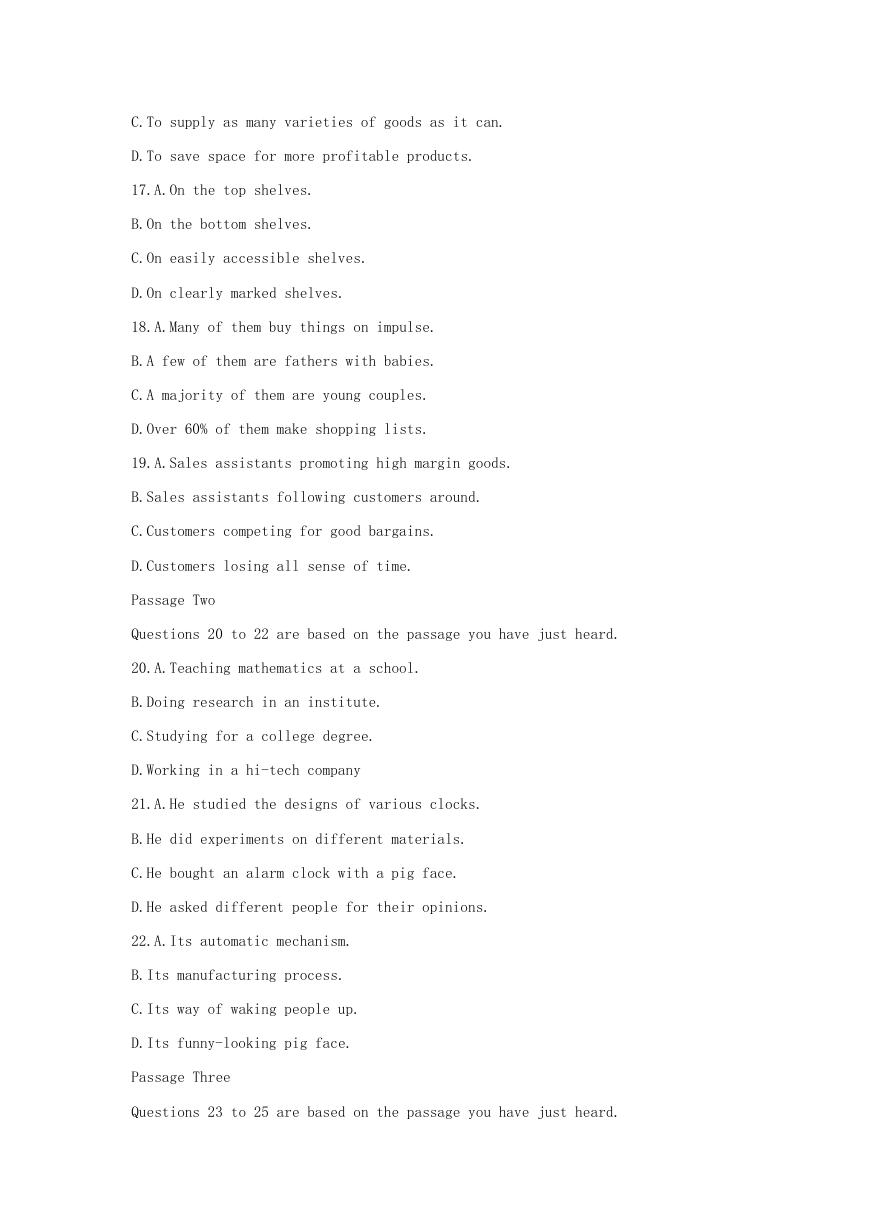
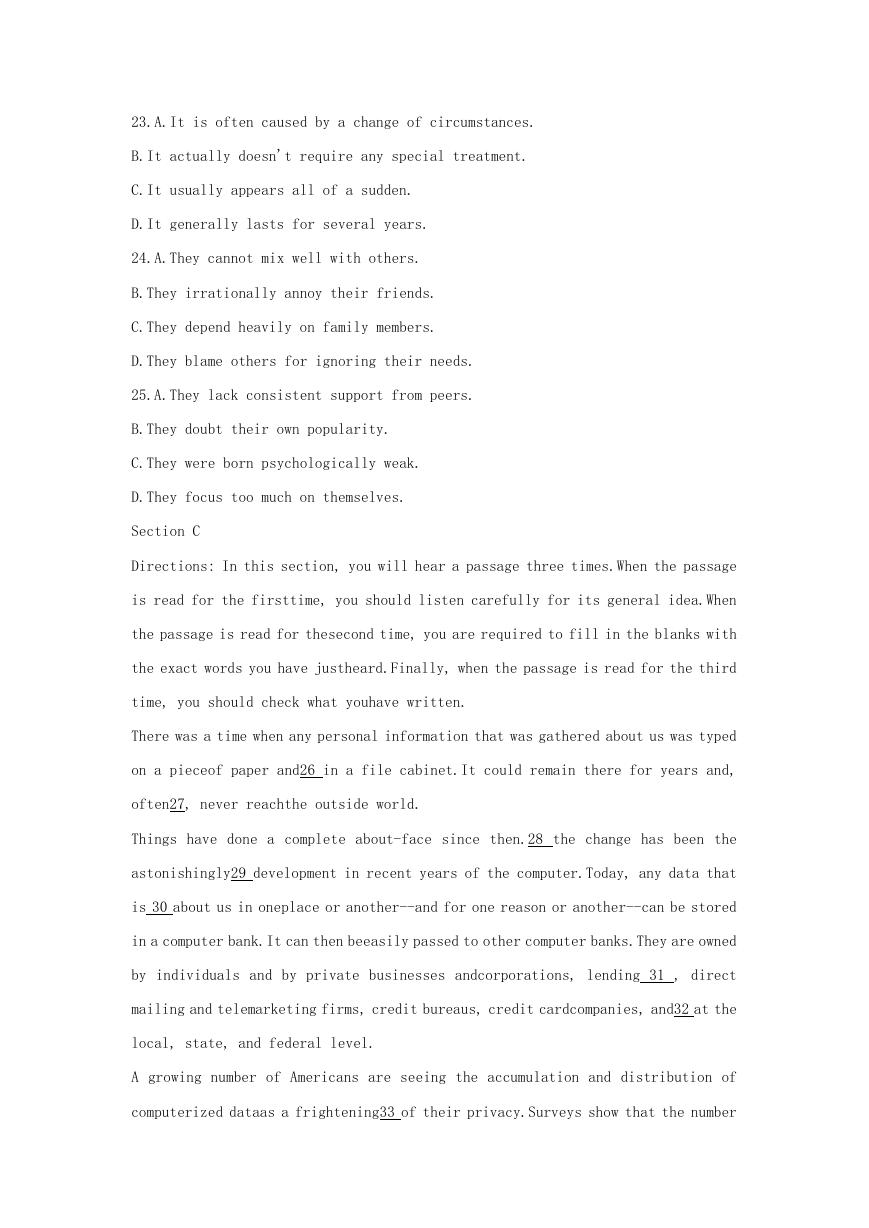
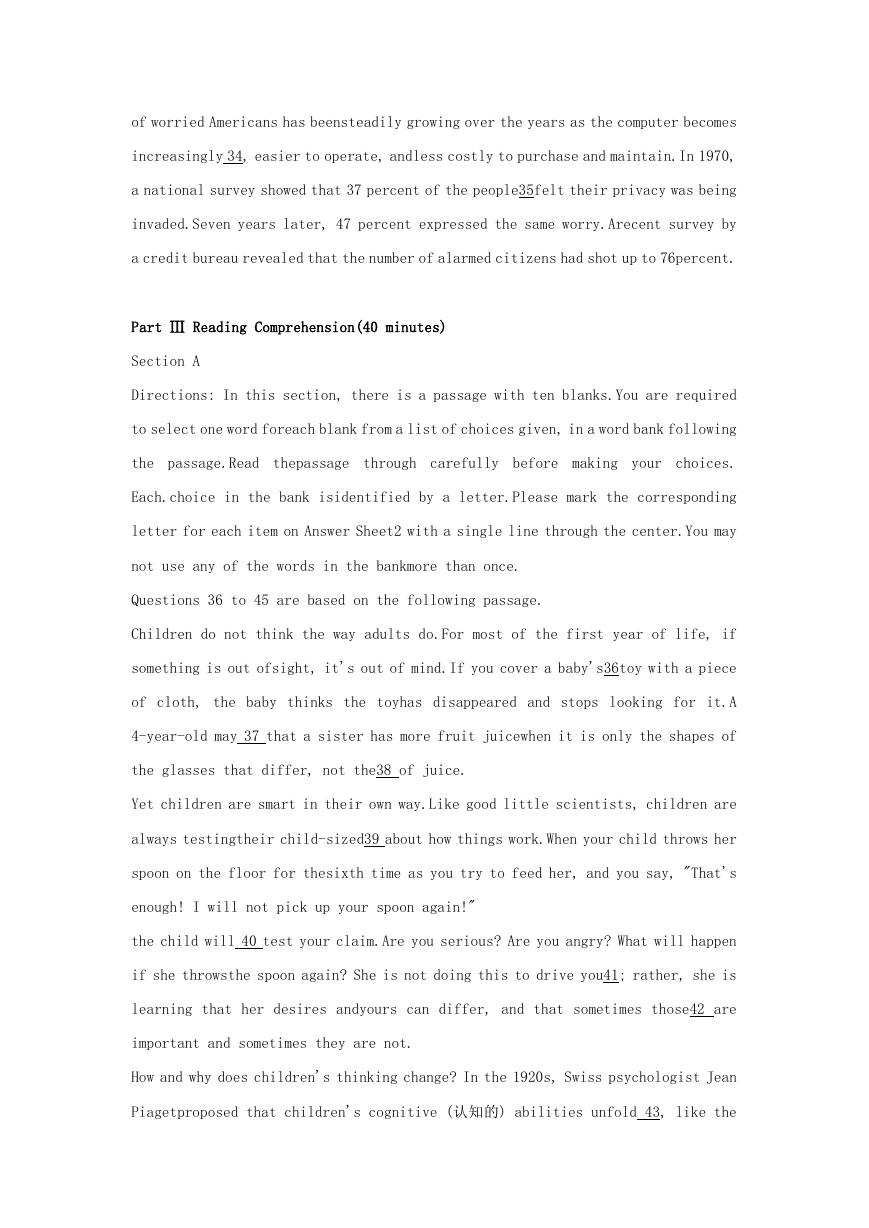
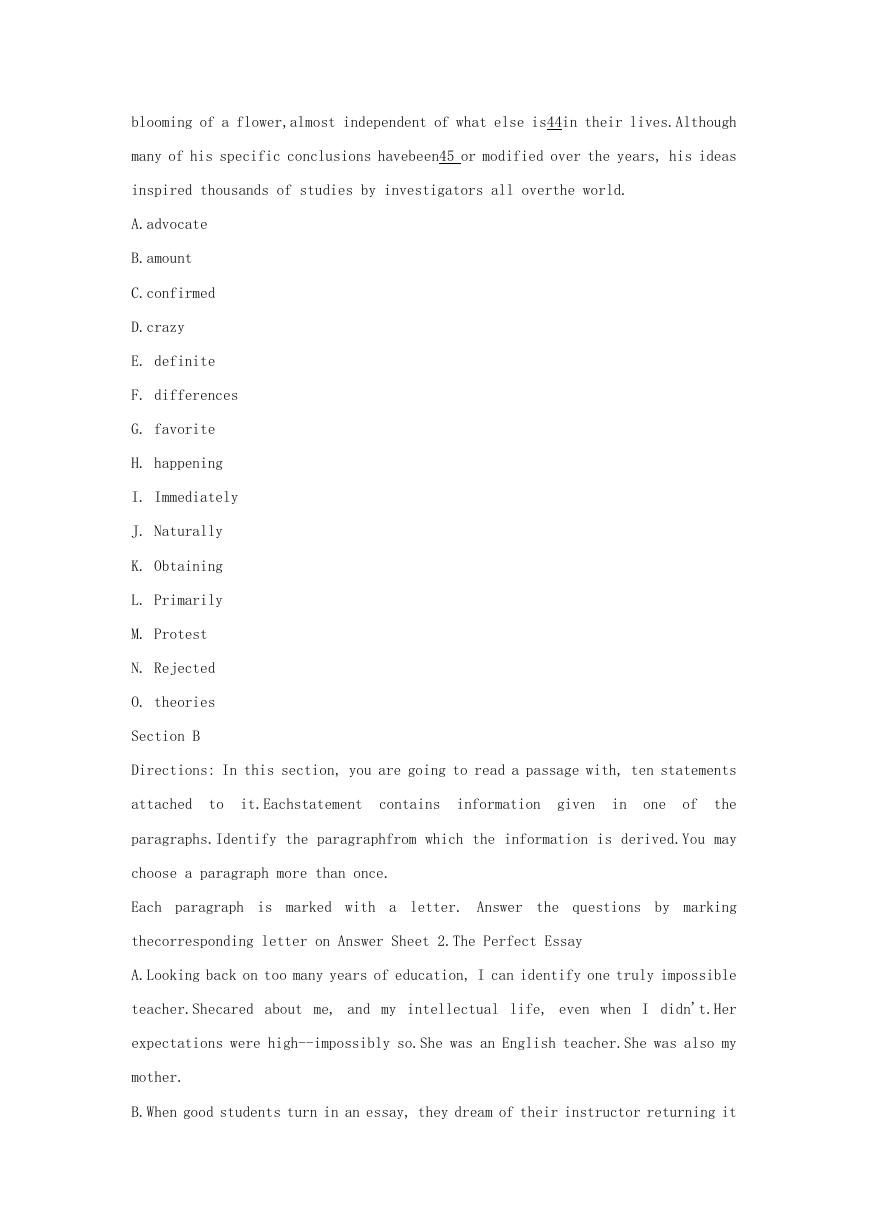
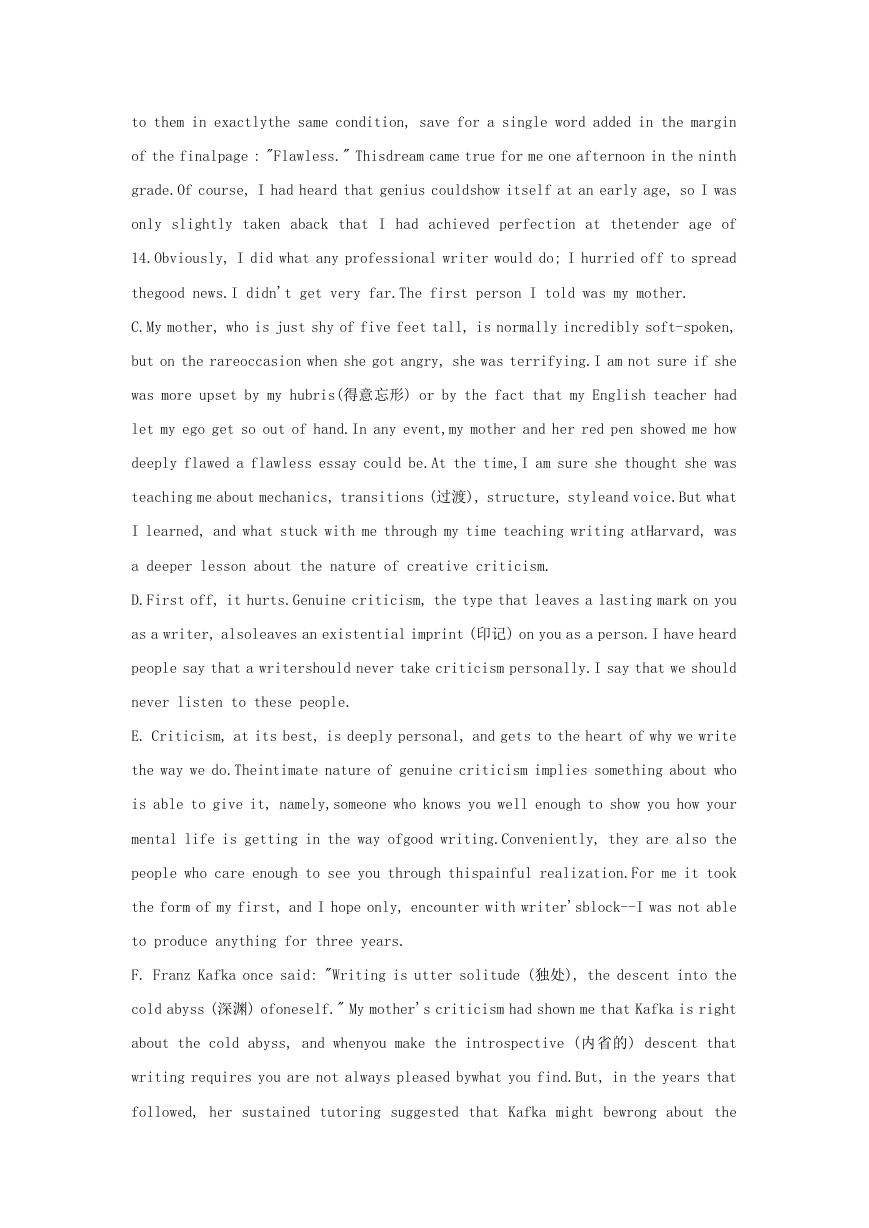








 2023年江西萍乡中考道德与法治真题及答案.doc
2023年江西萍乡中考道德与法治真题及答案.doc 2012年重庆南川中考生物真题及答案.doc
2012年重庆南川中考生物真题及答案.doc 2013年江西师范大学地理学综合及文艺理论基础考研真题.doc
2013年江西师范大学地理学综合及文艺理论基础考研真题.doc 2020年四川甘孜小升初语文真题及答案I卷.doc
2020年四川甘孜小升初语文真题及答案I卷.doc 2020年注册岩土工程师专业基础考试真题及答案.doc
2020年注册岩土工程师专业基础考试真题及答案.doc 2023-2024学年福建省厦门市九年级上学期数学月考试题及答案.doc
2023-2024学年福建省厦门市九年级上学期数学月考试题及答案.doc 2021-2022学年辽宁省沈阳市大东区九年级上学期语文期末试题及答案.doc
2021-2022学年辽宁省沈阳市大东区九年级上学期语文期末试题及答案.doc 2022-2023学年北京东城区初三第一学期物理期末试卷及答案.doc
2022-2023学年北京东城区初三第一学期物理期末试卷及答案.doc 2018上半年江西教师资格初中地理学科知识与教学能力真题及答案.doc
2018上半年江西教师资格初中地理学科知识与教学能力真题及答案.doc 2012年河北国家公务员申论考试真题及答案-省级.doc
2012年河北国家公务员申论考试真题及答案-省级.doc 2020-2021学年江苏省扬州市江都区邵樊片九年级上学期数学第一次质量检测试题及答案.doc
2020-2021学年江苏省扬州市江都区邵樊片九年级上学期数学第一次质量检测试题及答案.doc 2022下半年黑龙江教师资格证中学综合素质真题及答案.doc
2022下半年黑龙江教师资格证中学综合素质真题及答案.doc